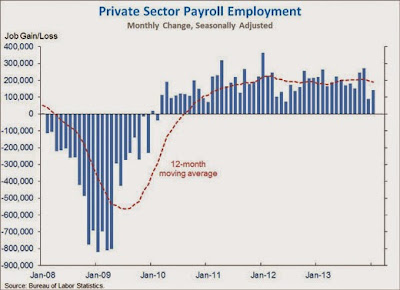in the time remaining, to help us understand how the man-made system of capitalism will lead to the extinction of our human species, and so many others.
We’ve lived so long under the spell of hierarchy—from god-kings to feudal lords to party bosses—that only recently have we awakened to see not only that “regular” citizens have the capacity for self-governance, but that without their engagement our huge global crises cannot be addressed. The changes needed for human society simply to survive, let alone thrive, are so profound that the only way we will move toward them is if we ourselves, regular citizens, feel meaningful ownership of solutions through direct engagement. Our problems are too big, interrelated, and pervasive to yield to directives from on high.
—Frances Moore Lappé, excerpt from Time for Progressives to Grow Up
Tuesday, November 11, 2014
This Chart Shows How The Biggest Problem in the Jobs ‘Recovery’ Keeps Getting Worse (by the Atlanta Fed!)
It's becoming so obvious that the much celebrated "jobs recovery" is another public relations stunt that even mainstream media isn't buying it, or at least, not all of it. (See this, this, this, and this.)
By focusing in on those hit hardest by this "job recovery", hourly-wage workers, Richter finds a report from the Atlanta branch of the Fed that reveals more of the truth about it. You see, graphs, like statistics, can lie or show the truth. First, look at what the current administration shows as evidence supporting the recovery:
This government supplied graph looks impressive, doesn't it?
Okay, then look at the graph below this which Richter obtained from the Atlanta branch of the Federal Reserve and we learn that much of the data from the Obama administration is padded with part-time employees from 2008 to 2014.
Richter then does his own calculations to compare wage growth between part-time and full time employees from August of 2011 to approximately April of 2013. Clearly employers are cutting costs and possibly increasing profits by using part-time workers. It's also clear why employers don't mind high unemployment. They get a disciplined workforce: workers eager to work, likely won't ask for raises, and won't complain about working conditions.
What is missing from both the administration and this report are data about those who have completely dropped out of the labor market because they couldn't find any jobs, except possibly under-the-table work for cash.
Then he breaks down wage growth by education for the latter period to see how different workers are affected--and it ain't pretty.



